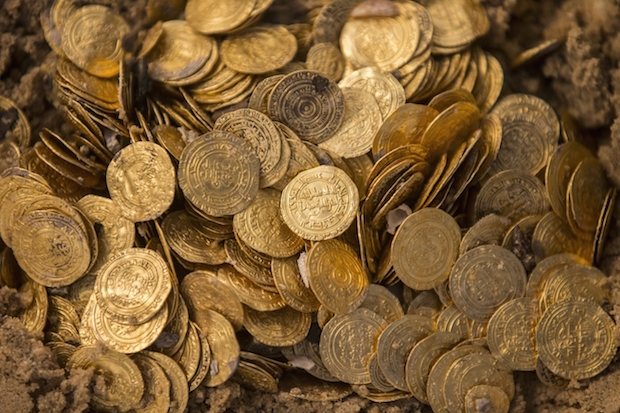From ‘Phantom Gold’, The Spectator, 17 July 1915:
There is something about the sight of golden coins which excites the imagination. Was it for economic nations alone that the world settled upon gold as the universal token? What delight children take in counters made to represent sovereigns—small children who have certainly never possessed a real twenty shillings. They know the round yellow shams have no value, they do not think about spending them seriously, but they love to play with them nevertheless. There are analogous games which we all play with phantom counters from time to time. The counters represent nothing that we have, or have lost, or even expect to have; they represent our friends’ incomes. These tokens represent a very uncertain quantity. We are not a bit sure what our friends have to spend; we only know how, if we had what they have, we should spend it. The further we are from any accurate knowledge the better is the fun. “I should not wonder if So-and-so has so much a year,” we say, and we proceed to rearrange his life on a different money basis. We take his son from Marlborough and send him to Eton; we sell his carriage horses and buy him a smart car; we dress his wife and daughters in a more suitable manner; we take a flat in town for them and we sublet his shooting. We wonder whether it is ho or his wife who is the mean one, and we consider what he ought to give his daughter on her marriage.
We get a good deal of entertainment with the phantom counters which represent his fortune. We have a notion that this is a game played a great deal by servants. It is a mere notion, because no one knows the mind of a servant where money is concerned; it is a sealed book. “They know nothing about money,” we hear their employers say with a sigh. But that is a mistake. They have as a class extraordinary economic perspicacity. They save, they maintain their relations, they make a brave show in the matter of clothes, and they almost never come to the workhouse. On the other hand, they do appear in certain ways to be more ignorant of money than any other set of people. They have a strange love of extravagance in others, and, if one may interpret their thoughts by their actions, are always rearranging their employers’ expenditure. Why in the world people with so much to spend should have so little to throw away they cannot see. It is very natural. We should all wonder at any care if we passed our days in the house of a millionaire, and yet had our homes in plain rectories and professional men’s houses. We should be very apt to play with their money—in imagination. And perhaps the habit is a safeguard against envy.






Comments